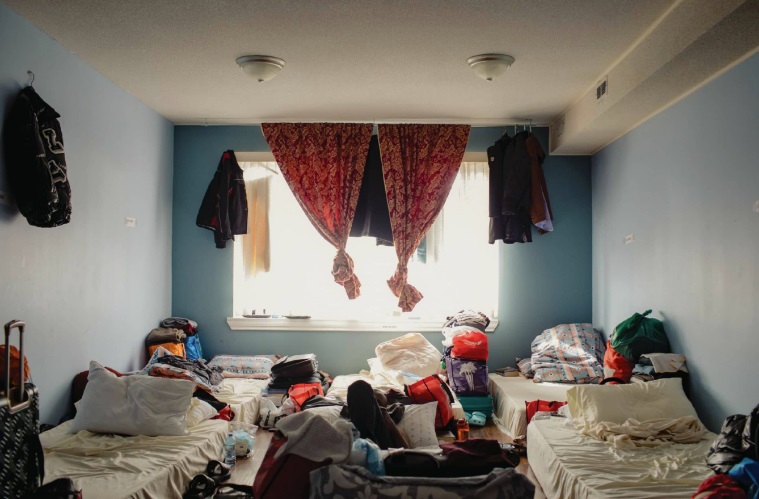Prøve GULL - Gratis
NOW HERE TO GO
Maclean's
|July 2024
Thousands of refugees live in shelters, hotels and on the streets of Canada's largest cities. How the country is struggling to cope with a massive surge in global asylum seekers.

Ann doesn't know how old she is. She thinks she's probably 40 or 41, but she became separated from her parents as a child, and she has no record of her birth. When she was a child she lived alone on the streets of Kampala, Uganda-one of thousands of homeless youth in the city-and survived by collecting plastic bottles and scrap to sell to recyclers. She slept outside at night, then later in a church, and attended school by day. Remarkably, after years of diligent study, she secured a high school scholarship, saved money and enrolled in university. She earned a degree in international business and began a career in business development for multinational corporations.
Ann, who asked me to use a pseudonym to protect her privacy, married and had three children. But her husband grew vicious to her and the kids, and she began to fear for her life. She fled Uganda alone, planning for her children to join her later. She went first to the Middle East, where authorities seemed indifferent, before a friend told her to try Canada. With a visitor visa in hand, she used what little money she had to book a plane ticket and an Airbnb in Etobicoke, in Toronto's west end, for five days last November. The first day, she phoned Legal Aid Ontario and asked how to make an asylum claim. She asked whether she'd be welcome and safe in Canada and when her children would be able to join her, and was told that her concerns would be dealt with in time. To find a place to stay, she called Central Intake, Toronto's 24-hour hotline for emergency shelter.
Over countless calls across four days, the Central Intake operators told her every shelter in the city was full; one suggested she extend her Airbnb stay. She found a list of shelters in the city. One by one, she visited each by bus or on foot.
Denne historien er fra July 2024-utgaven av Maclean's.
Abonner på Magzter GOLD for å få tilgang til tusenvis av kuraterte premiumhistorier og over 9000 magasiner og aviser.
Allerede abonnent? Logg på
FLERE HISTORIER FRA Maclean's

Maclean's
The University's Post-Book Future
Students don't want to read novels anymore. I've filled my English-lit syllabus with movies to help them learn anyway.
4 mins
January / February 2026

Maclean's
Buy Canadian Will Transform Supply Chains
Trump's tariff chaos will prompt local food producers to expand at record speed
3 mins
January / February 2026
Maclean's
The Rise of the Micro-Restaurant
Tiny establishments like Yan Dining Room, my 26-seater in Toronto, are feeding Canadians' appetites for something new
4 mins
January / February 2026

Maclean's
Education
The international-student shortfall will worsen schools' financial woes. Donald Trump's assault on academia will hinder and help Canadian campuses. And school boards will scramble to fill teacher shortages.
4 mins
January / February 2026

Maclean's
Food
Buy Canadian fever will give us more B.C. wine, Ontario ice cream and locally grown winter strawberries-while Indigenous cuisine will have its overdue moment
4 mins
January / February 2026

Maclean's
The Adult Rec-Sports Boom
Fed up with phones, Canadians are making friends on the field
4 mins
January / February 2026
Maclean's
Concert Tickets Might Finally Get Cheaper
In 2026, we'll need fewer stadium extravaganzas and more intimate shows at small venues
3 mins
January / February 2026

Maclean's
Climate
Wildfire displacement will redraw the map, EV adoption will decelerate and Canada will miss its emissions targets. Throughout it all, Mark Carney will put climate on the backburner.
4 mins
January / February 2026

Maclean's
Canada's China Policy Will Be Decided in Washington
If Trump talks fail, Canada could look toward Beijing
3 mins
January / February 2026

Maclean's
Justice for Stablecoins
For years, people thought fiat-backed crypto was all hype, no value. Now that the government's on board, Canadians should be too.
4 mins
January / February 2026
Listen
Translate
Change font size

